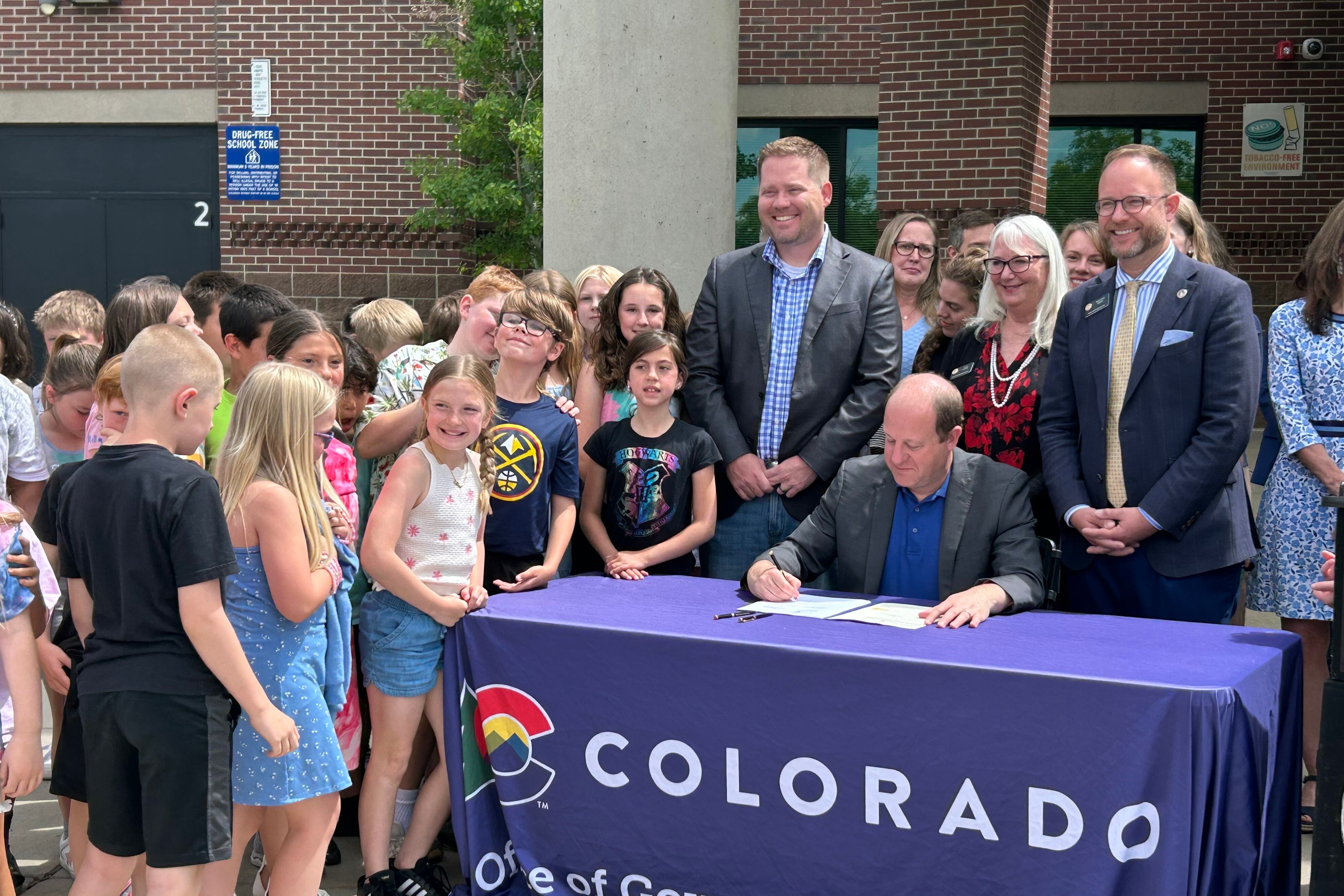Sign up for Chalkbeat Colorado’s free daily newsletter to get the latest reporting from us, plus curated news from other Colorado outlets, delivered to your inbox.
Surrounded by smiling supporters and curious fourth graders, Gov. Jared Polis on Friday signed a bill into law that will require universal dyslexia screenings in Colorado schools starting in the 2027-28 school year.
The sunny signing ceremony outside the front doors of Lukas Elementary School in Westminster was a momentous occasion. For students, it was the only thing besides lunch separating them from the start of summer break. For advocates of children with dyslexia, it was the culmination of a dogged effort to ensure students with the most common learning disability are flagged early so they can get the help they need.
The dyslexia bill, one of three education bills signed into law at the ceremony, was especially personal to some lawmakers. Rep. Matt Soper, a Republican representing western Colorado and one of the bill sponsors, has dyslexia and talked about his reading struggles growing up. Polis noted that both his father and his fifth grade daughter have dyslexia.
Sen. Kyle Mullica, a Democrat representing parts of Adams County and one of the bill sponsors, choked up as he talked about the mental health toll dyslexia once took on his daughter, who’s now a sixth grader.
“I’m going to go home and tell my daughter that we did something for her today,” he said. “I’m going to tell all those students who are falling through the cracks that we’ve done something for them.”
Dyslexia is a common learning disability that makes it hard to decode and spell words, but with the right instruction, students with dyslexia can do as well as their peers in school. About 15% to 20% of the population has dyslexia, according to the Colorado Department of Education.
While the new law, which comes with no funding, won’t immediately require schools to screen kindergarten through third grade students for signs of dyslexia, it marks another milestone in the state’s ongoing campaign to boost reading proficiency among Colorado students. Over the last seven years, state leaders have cracked down on debunked reading curriculum, required more training for elementary teachers and principals, and held teacher prep programs to higher standards for how they train future elementary educators to teach reading.
About a dozen Colorado school districts currently screen all students in certain elementary grades for dyslexia. Two more — Jeffco and Douglas County — will start next year and by 2027-28, more than 160 other districts are expected to join the club.
Parents and advocates never gave up the fight
At Friday’s ceremony, Rachel Dobronyi, a senior at the Colorado School of Mines, was one of four students with dyslexia invited to stand near the podium during lawmakers’ speeches.
An environmental engineering major, Dobronyi said she entered college reading at a second grade level. She participated in a special two-year program to help her re-learn how to read. One of her biggest moments, she said, was her 19th birthday when she was able to read her birthday cards for the first time.
For Rachel, and her mother Amy Dobronyi, a longtime advocate for children with dyslexia, Friday’s signing was emotional. During the event, Amy leaned into Rachel and told her, “I did this for you, and your dad, and your brother.”
Rachel almost started to cry during the ceremony.
“It was really amazing,” she said. “I’ve watched my mom fight for these bills for so long.”
The new dyslexia law, a bipartisan effort that had more than 60 lawmakers sign on as co-sponsors, represents the third attempt since 2019 to require statewide dyslexia screening. An even earlier effort in 2008 led to a mostly toothless law that allowed but didn’t require the state education department to offer school districts training on dyslexia.
Still, it was progress, said Sally Pistilli, a Douglas County mother who started pushing for changes many years ago after her own son, now an adult, was diagnosed with dyslexia after second grade.
“You have to understand that back then, you couldn’t even really say the word dyslexia in most schools,” she said. “It was a victory in that we got a bill passed with the word dyslexia in it.”
The 2008 law didn’t do a lot, but it helped lead to the passage of Colorado’s flagship reading law — the READ Act — four years later, said Pistilli, who was unable to attend Friday’s signing event. That law mandated reading assessments for all K-3 students and reading plans for those who were farthest behind. But the assessments often missed kids with dyslexia, continuing the cycle of failure and frustration.
Around that time, a fellow dyslexia advocate bought Pistilli a joke gift acknowledging the slow pace of progress: a purple and green T-shirt that said, “For our grandchildren.”
“She kind of really foresaw what was happening,” Pistilli said of her friend, who has since died but is survived by grandchildren.
Today, Pistilli has two Colorado grandchildren of her own, a 4-month-old, and one who is almost 2.
“I am beyond thrilled to be able to see [screening] happen for all the kids, but now my own grandchildren as well,” she said.
Ann Schimke is a senior reporter at Chalkbeat, covering early childhood issues and early literacy. Contact Ann at aschimke@chalkbeat.org






